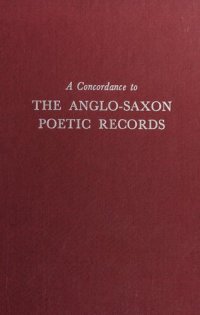
Ebook: A Concordance to the Anglo-Saxon Poetic Records
- Genre: Literature
- Series: The Cornell Concordances
- Year: 1978
- Publisher: Cornell University Press
- City: Ithaca
- Language: English, Old English
- pdf
Edited by J. B. Bessinger, Jr. Programmed by Philip H. Smith, Jr. With an Index of Compounds compiled by Michael W. Twomey.
This exhaustive concordance to the corpus of extant Old English verse was prepared over a period of years with the help of a number of computers, most of them long since dismantled, and a larger number of friends, advisers, and corporate sponsors in Canada and the United States. The early history of the project is detailed in our two prefaces to 'A Concordance to Beowulf' (Ithaca, 1969), wherein we compare our poem-delimited trial effort, both to its advantage and disadvantage, with Albert S. Cook’s concordance to that poem (Halle, 1911). The only comparable index to the Old English poetic corpus is in many ways as useful as Cook’s work for those who are willing to make allowances for the antiquity of its copy-texts and the selectivity of its listings: the 'Sprachschatz der angelsächsischen Dichter', first published by C. W. M. Grein in 1864 and substantially re-edited by Ferdinand Holthausen and J. J. Köhler (Heidelberg, 1912).
The copy-text for our concordance is that of the individual poems edited in six volumes as 'The Anglo-Saxon Poetic Records: A Collective Edition' (referred to below as ASPR) by George Philip Krapp and Elliott Van Kirk Dobbie (New York: Columbia University Press, 1931-1953), plus a single late poem in Old English edited as 'Instructions for Christians' by James L. Rosier in 'Anglia', 82 (1964), with addenda in 84 (1966). We extend our special thanks to the editors and publishers who gave permission for the use of these texts and thus made this concordance possible.
In the 30,535 lines (verse-pairs) of the corpus, there occur, so our machines have informed us, 175,038 unhyphenated poetic words, all of which are to be found in the present concordance in all their occurrences and under their appropriate unlemmatized headwords. We have omitted only the prose words of 'The Metrical Charms' and a few amens and finits, along with extrapoetic phenomena like 'Salomon cwæð' and runes substituting for capital letters.
This exhaustive concordance to the corpus of extant Old English verse was prepared over a period of years with the help of a number of computers, most of them long since dismantled, and a larger number of friends, advisers, and corporate sponsors in Canada and the United States. The early history of the project is detailed in our two prefaces to 'A Concordance to Beowulf' (Ithaca, 1969), wherein we compare our poem-delimited trial effort, both to its advantage and disadvantage, with Albert S. Cook’s concordance to that poem (Halle, 1911). The only comparable index to the Old English poetic corpus is in many ways as useful as Cook’s work for those who are willing to make allowances for the antiquity of its copy-texts and the selectivity of its listings: the 'Sprachschatz der angelsächsischen Dichter', first published by C. W. M. Grein in 1864 and substantially re-edited by Ferdinand Holthausen and J. J. Köhler (Heidelberg, 1912).
The copy-text for our concordance is that of the individual poems edited in six volumes as 'The Anglo-Saxon Poetic Records: A Collective Edition' (referred to below as ASPR) by George Philip Krapp and Elliott Van Kirk Dobbie (New York: Columbia University Press, 1931-1953), plus a single late poem in Old English edited as 'Instructions for Christians' by James L. Rosier in 'Anglia', 82 (1964), with addenda in 84 (1966). We extend our special thanks to the editors and publishers who gave permission for the use of these texts and thus made this concordance possible.
In the 30,535 lines (verse-pairs) of the corpus, there occur, so our machines have informed us, 175,038 unhyphenated poetic words, all of which are to be found in the present concordance in all their occurrences and under their appropriate unlemmatized headwords. We have omitted only the prose words of 'The Metrical Charms' and a few amens and finits, along with extrapoetic phenomena like 'Salomon cwæð' and runes substituting for capital letters.
Download the book A Concordance to the Anglo-Saxon Poetic Records for free or read online
Continue reading on any device:

Last viewed books
Related books
{related-news}
Comments (0)